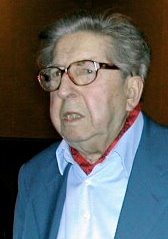
Henri Dutilleux
Henri Paul Julien Dutilleux (French: [ɑ̃ʁi dytijø]; 22 January 1916 – 22 May 2013) was a French composer of late 20th-century classical music. Among the leading French composers of his time, his work was rooted in the Impressionistic style of Debussy and Ravel, but in an idiosyncratic, individual style. Among his best known works are his early Flute Sonatine and Piano Sonata; concertos for cello, Tout un monde lointain... ("A whole distant world") and violin, L'arbre des songes ("The tree of dreams"); a string quartet known as Ainsi la nuit ("Thus the night"); and two symphonies: No. 1 (1951) and No. 2 Le Double (1959).[1]
"Dutilleux" redirects here. For other uses, see Dutilleux (surname).
Henri Dutilleux
22 May 2013 (aged 97)
- Composer
Works were commissioned from him by such major artists as Charles Munch, George Szell, Mstislav Rostropovich, the Juilliard String Quartet, Isaac Stern, Paul Sacher, Anne-Sophie Mutter, Simon Rattle, Renée Fleming, and Seiji Ozawa. In addition to composing, he worked as the Head of Music Production for Radio France for 18 years. He also taught at the École Normale de Musique de Paris and at the Conservatoire National Supérieur de Musique, and was twice composer in residence at the Tanglewood Music Center in Lenox, Massachusetts.
Among Dutilleux's many awards and honours were the Grand Prix de Rome (1938) and the Ernst von Siemens Music Prize (2005). When describing him, the music critic Paul Griffiths wrote that "Mr. Dutilleux’s position in French music was proudly solitary. Between Olivier Messiaen and Pierre Boulez in age, he was little affected by either, though he took an interest in their work. But his voice, marked by sensuously handled harmony and color, was his own."[2]
Legacy[edit]
After Dutilleux's death, the composer and conductor Laurent Petitgirard paid tribute to him as "one of the very rare contemporary composers" whose music became part of the repertoire in his lifetime, predicting that "[h]is work will remain intensely present after his death".[44]
Several major musicians and conductors championed Dutilleux's works, notably Stern, Sacher, Mutter, Fleming, Ozawa, Munch, Szell, Rostropovich, Simon Rattle, and the Juilliard String Quartet.
The conductor and composer Esa-Pekka Salonen said of Dutilleux, "His production is rather small but every note has been weighed with golden scales... It's just perfect – very haunting, very beautiful. There’s some kind of sadness in his music which I find very touching and arresting."[45]
The critic Tom Service wrote for the BBC, "Dutilleux's exquisite catalogue of pieces is becoming, rightly, ever more popular with performers and listeners all over the world".[46]
An obituary in Gramophone commented, "Dutilleux represented a generation of musicians with roots almost back into the 19th century; certainly his music can be seen in a direct line from that of his great predecessors Debussy and Ravel."[47] In an obituary in The Guardian, Roger Nichols described him as "the outstanding French composer between Messiaen and Boulez", adding that he "achieved a wholly individual synthesis of ear-catching colours and harmonies with formal rigour."[48]
The Daily Telegraph said, "Because Dutilleux was a perfectionist and self-critical to a fault, his output was small. He wrote barely a dozen major works in his career, destroyed much of his early music and often revised what he had written. His early work was clearly derivative of Ravel, Debussy and Roussel; but his later music, though influenced by Bartok and Stravinsky, was entirely original and often seemed—in its scale—more German than French." The Daily Telegraph's critic Philip Hensher called Dutilleux "the Laura Ashley of music; tasteful, unfaultable, but hardly ever daring ... Personally, I can’t stick him."[49]
Rob Cowan, the BBC Radio 3 presenter and critic, recalled in June 2013 an interview with Dutilleux in which he told Cowan that his personal favourite among his own works was Tout un monde lointain....[50]